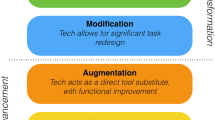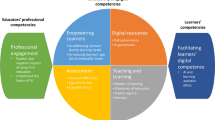Abstract
The stated aim of technology education in New Zealand is to develop students' level of technological literacy. This paper introduces the Technology Assessment Framework (TAF) as an organisational tool for the development and delivery of technology programmes that focus on increasing students' technological literacy through the enhancement of their technological practice across technological areas and contexts. The TAF was developed and refined in 1999 and 2000 as part of a two year New Zealand Ministry of Education funded research project, and integrated within a national professional development programme in 2000 designed for preservice and inservice teacher educators in New Zealand.
This paper backgrounds the sociocultural theoretical position of the TAF and explains how it reflects and furthers the aim of technology education in New Zealand. The TAF is then presented and explained with the aid of illustrative examples from classroom practice.
Similar content being viewed by others
REFERENCES
Assessment of Performance in Design and Technology: 1991, ‘the Final Report of the A.P.U. Design and Technology Project 1885–1991;’, School Examinations and Assessment Council Nottinghill Gate London.
Brown, J. S., Collins, A. & Duguid, P.: 1989, ‘Situated Cognition and the Culture of Learning', Educational Researcher 18(1), 32-41.
Burns, J.: 1997, ‘Implementing the Technology Curriculum: Promise and Prospect', Paper presented at the inaugural Technology Education in New Zealand (TENZ) conference. Christchurch, October 1997.
Compton V. J.: 1997, ‘Implementing Technology Education in New Zealand Schools', in J. Burns (ed.), Technology in the New Zealand Curriculum-Perspectives on Practice, Dunmore Press, Palmerston North.
Compton V. J.: 2001, ‘Developments in Technology Education in New Zealand 1993-1995: An Analysis of the Reflections of Key Participants', Unpublished Doctoral Thesis, University of Waikato, New Zealand.
Compton, V. J. & Harwood, C. D.: 1999a, ‘TEALS Research Project: Starting Points and Future Directions', Paper presented at the 2nd TENZ Conference, Auckland New Zealand, 14-16 April 1999.
Compton, V. J. & Harwood, C. D.: 1999b, ‘TEALS Research Project: From Directions to Classroom Practice', Paper presented at the 30th Australasian Science Education Research Association Conference (ASERA), Rotorua, New Zealand: 8-11th July 1999.
Compton, V. J. & Jones, A. T.: 1998, ‘Reflecting on Teacher Development in Technology Education: Implications for Future Programmes', International Journal of Design and Technology Education 8(2), 151-166.
Davies, J.: 1998, ‘Constructing Technology Education: Questions of Purpose and Fit', New Zealand Annual Review of Education, 119-146.
France, B. J.: 1997, ‘Realising the Technology Curriculum: Professional Development in Biotechnology Education', Unpublished Doctoral Thesis. Centre for Science, Mathematics, and Technology Education Research, University of Waikato: Hamilton.
Gipps, C.: 1999, ‘Socio-cultural Aspects of Assessment', Review of Research in Education 24 (September).
Goodson, I. F.: 1985, ‘Subjects for Study', in I. F. Goodson (ed.), Social Histories of the Secondary Curriculum, Falmer Press, Lewes.
Harwood, C. D. & Compton, V. J.: 2000a, ‘Milestone Two’ of Ministry of Education professional development contract-Technology Education Assessment national professional development (TEAN PD 2000). Joint contract between Centre for Educational Development, Massey University, Palmerston North and Auckland College of Education, Auckland.
Harwood, C. D. & Compton, V. J.: 2000b, ‘Milestone Six’ of Ministry of Education Research Project-Technology Education Assessment in Lower Secondary (TEALS 2000). Joint contract between Centre for Educational Development, Massey University, Palmerston North and Auckland College of Education, Auckland.
Hattie J. & Jaeger, R.: 1998, ‘Assessment and Classroom Learning: A Deductive Approach', Assessment in Education 5(1), 111-122.
Jones, A. T.: 1995, ‘Technology Education in the New Zealand Curriculum: From Policy to Curriculum', in SAMEpapers 95, Centre for Science, Mathematics, and Technology Education Research, University of Waikato: Hamilton.
Jones, A. T.: 1998, ‘The Development of Technology Education in New Zealand', The Technology Teacher 58(3), 13-18.
Jones, A. T.: 2001, ‘Researching and Enhancing Teacher and Student Technological Literacy', NARST symposium 25-28 March 2001.
Jones, A. T. & Compton, V. J.: 1998, ‘Towards a Model for Teacher Development in Technology Education: From Research to Practice', International Journal of Design and Technology Education 8(1), 51-65.
Jones, A. T., Mather V. J. & Carr, M. D.: 1994, Issues in the Practice of Technology Education, Centre for Science and Mathematics Education Research, University of Waikato: Hamilton.
Lave, J.: 1993, ‘The Practice of Learning', in S. Chaiklin & J. Lave (eds.), Understanding Practice: Perspectives of Activity and Context, Cambridge University Press, Cambridge.
Lave, J. & Wenger, E.: 1991, Situated Learning: Legitimate Peripheral Participation, Cambridge University Press, Cambridge, MA.
Mather, V. J.: 1994, ‘Students' Concepts of Technology and Technology Education: Implications for Practice', Unpublished Masters Thesis. University of Waikato, Hamilton.
Ministry of Education: 1995, Technology in the New Zealand Curriculum, Learning Media, Wellington.
Ministry of Education: 2001, ‘NCEA Detailed Explanatory Notes for Level One Technology Achievement Standards. New Zealand Ministry of Education Website 2001. URL http://minedu.govt.nz/web/downloadable/dl4271_vl/tech%20Level%201%20Ex%20notes. PDF.
Paechter, C.: 1991, ‘Subject Subcultures and the Negotiation of Open Work: Conflict and Co-operation in Cross-curricular Course Work', Paper presented to the St Hilda's Conference, Education and Qualitative Research: Teaching, Learning and educational Change. Warwick University, 1991.
Rogoff, B.: 1991, Apprenticeship in Thinking: Cognitive Development in Social Context, Oxford University Press: Oxford.
Roth, W.: 1998, Designing Communities, Science and Technology Education Libraries, Kluwer Academic Publishers, Dordrecht.
Russell, J.: 2001, ‘Enabling Learning: School Leadership at Work', Keynote Address, Annual Conference of the Secondary Principals' Association of New Zealand. Wellington, 25-29 March 2001.
Sadler, R.: 1989, ‘Formative Assessment and the Design of Instructional Systems', Instructional Science 18, 119-144.
Shield, G.: 1996, ‘Formative Influences on Technology Education: The Search for an Effective Compromise in Curriculum Innovation', Journal of Technology Education 8(1), 50-60.
Thompson, E.: 1990, ‘Promoting Individuality and Originality', in L. Tickle (ed.), Design and Technology in Primary Classrooms, Falmer Press, London.
Wertsch, J. V.: 1991, Voices of the Mind: A Sociocultural Approach to Mediated Action, Harvard University Press, Cambridge Massachusetts.
Author information
Authors and Affiliations
Rights and permissions
About this article
Cite this article
Compton, V., Harwood, C. Enhancing Technological Practice: An Assessment Framework for Technology Education in New Zealand. International Journal of Technology and Design Education 13, 1–26 (2003). https://doi.org/10.1023/A:1022318118467
Issue Date:
DOI: https://doi.org/10.1023/A:1022318118467




